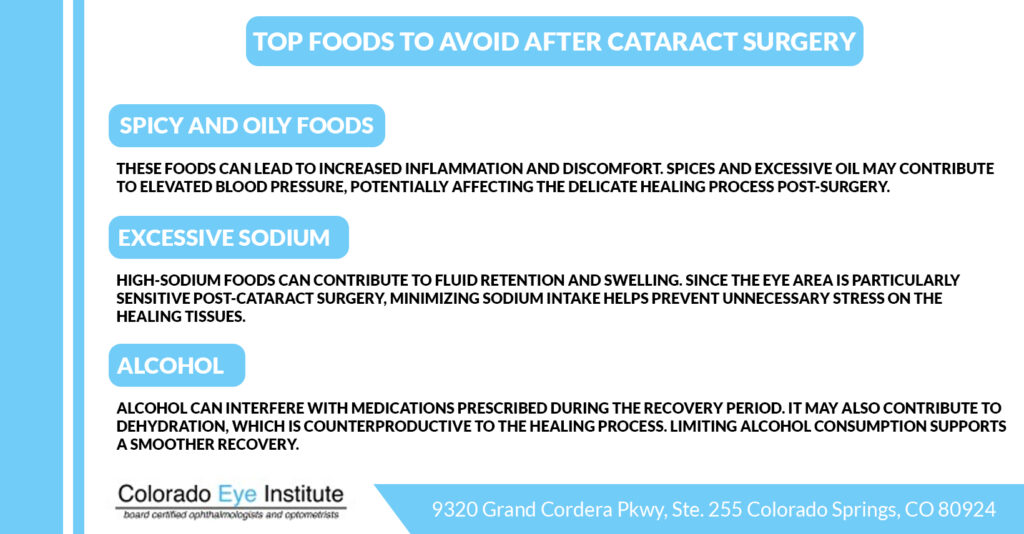Cataract surgery recovery involves a multifaceted approach encompassing dietary considerations, rest, and lifestyle adjustments. Cataract surgery is a remarkable and transformative procedure, involving removing the cloudy lens and replacing it with a clear artificial lens, bringing a renewed clarity to the patient’s vision. This surgery is not just a medical intervention but also a journey towards enhanced visual well-being. Post-surgery, the body undergoes a healing process, and certain precautions can significantly influence the outcome.
A key factor in cataract surgery recovery is nutrition, which plays a pivotal role in not only preventing complications but also expediting recovery. Let’s explore the foods to avoid after cataract surgery, those that aid in quick healing, and the optimal post-cataract surgery lifestyle.
Top Foods to Avoid After Cataract Surgery
Certain foods can hinder the healing process or cause complications post-cataract surgery. Here is the list of foods to avoid after cataract surgery:

1. Spicy and Oily Foods
These foods can lead to increased inflammation and discomfort. Spices and excessive oil may contribute to elevated blood pressure, potentially affecting the delicate healing process post-surgery.
2. Excessive Sodium
High-sodium foods can contribute to fluid retention and swelling. Since the eye area is particularly sensitive post-cataract surgery, minimizing sodium intake helps prevent unnecessary stress on the healing tissues.
3. Alcohol
Alcohol can interfere with medications prescribed during the recovery period. It may also contribute to dehydration, which is counterproductive to the healing process. Limiting alcohol consumption supports a smoother recovery.
By avoiding these specific foods, patients can create an environment conducive to optimal healing, reduce the risk of complications, and promote a more comfortable recovery experience. It’s crucial to adhere to the dietary recommendations provided by our healthcare professionals to ensure the best possible outcome after cataract surgery.
Top Foods to Eat After Cataract Surgery for Faster Recovery
Omega-3 Fatty Acids — A Key Nutrient:
- Scientific support: Omega-3 fatty acids, particularly DHA and EPA, are essential components of cell membranes in the eyes. They contribute to the structural integrity of the retina and are concentrated in the light-sensitive cells. A deficiency in omega-3s may affect visual function.
- Food sources: Fatty fish like salmon, trout, and mackerel are rich in these fatty acids. Consuming these fish varieties supports retinal health and aids in the overall healing process post-cataract surgery.
Vitamin C — Guardian of Eye Antioxidants:
- Scientific support: Vitamin C is a potent antioxidant that helps protect the eyes from oxidative stress, which is crucial during the healing phase post-cataract surgery. It plays a role in collagen formation, supporting the cornea and other eye tissues.
- Food sources: Citrus fruits like oranges, strawberries, and kiwi are not only delicious but also provide a significant dose of vitamin C. Including these fruits in your diet enhances the body’s ability to combat inflammation and oxidative damage.
Leafy Greens — Lutein and Zeaxanthin Powerhouse:
- Scientific support: Lutein and zeaxanthin are carotenoids that accumulate in the retina, particularly the macula. They act as natural sun blockers, protecting the eyes from harmful high-energy light waves like ultraviolet rays.
- Food sources: Spinach and kale are leafy green champions, rich in lutein and zeaxanthin.
Incorporating these greens into your diet supports macular health, aids in reducing the risk of age-related macular degeneration (AMD), and contributes to an overall improvement in vision.
These nutrients, when combined, create a synergistic effect, fortifying the eyes against potential complications and expediting the healing process. Omega-3 fatty acids provide structural support, vitamin C acts as a shield against oxidative stress, and lutein/zeaxanthin duo safeguards the macula, contributing to a comprehensive approach to eye health.
Creating a well-rounded diet that incorporates these essential nutrients ensures a holistic approach to eye health. While individual components contribute uniquely, the collective impact is greater, fostering an environment conducive to swift recovery and long-term eye well-being.
For personalized guidance and expert care during the cataract surgery recovery, trust Colorado Eye Institute. Our experienced team is dedicated to your visual well-being. Click here for a consultation or, give us a call at (719) 258-1240, to learn more.
Frequently Asked Questions (FAQs)
Can I eat eggs after cataract surgery?
Yes, eggs are an excellent source of protein and can be consumed post-surgery. They aid in tissue repair and promote overall eye health.
How many days rest is needed after cataract surgery?
Typically, patients are advised to rest for a few days after surgery to allow the eyes to heal. This period may vary based on individual recovery.
Is watching television safe post cataract surgery?
While it’s generally safe, moderation is key. Follow your doctor’s recommendations regarding screen time to avoid strain on the eyes.
How soon can I resume work after cataract surgery?
Most individuals can return to work within a few days, depending on the nature of their job and the pace of their recovery.
Can I drive after cataract surgery?
Driving restrictions may apply initially, but your surgeon will provide guidance. It’s crucial to ensure your vision is stable before resuming driving.
